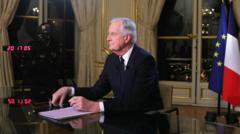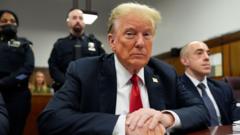French Prime Minister Michel Barnier is facing a critical moment in France’s ongoing political crisis, with opposition parties preparing a no-confidence vote against his minority government. The situation stems from Barnier’s controversial decision to use special presidential powers to force through a budget without parliamentary approval.
The budget bill, which proposed €60bn in tax rises and spending cuts, highlighted the fragile political landscape in France. Barnier was forced to make concessions due to his lack of parliamentary majority, ultimately resorting to invoking a presidential decree to push through social security reforms.
This political uncertainty originated from President Emmanuel Macron’s snap elections over the summer, which resulted in a hung parliament where no political group secured an absolute majority. Despite a left-wing alliance winning the most seats, Macron appointed the conservative Barnier in an attempt to restore political stability.
In a recent television interview with TF1 and France 2, Barnier acknowledged the unprecedented political situation, noting this is the first time since 1958 that no clear parliamentary majority exists between three major political groups. He described the current political environment as “fragile and ephemeral” while maintaining a measured approach to his potential political survival.
Barnier explicitly rejected suggestions that President Macron should resign, instead calling him a “guarantee of stability.” He also downplayed concerns about his own political future, stating that he arrived in his position on September 5th prepared to potentially leave the next morning.
However, the political landscape looks challenging for Barnier. The left-wing bloc in the National Assembly, along with the far-right, are expected to support the no-confidence motion. If the vote succeeds, Barnier will remain as a caretaker prime minister until Macron announces a new government.
Macron, currently on a state visit to Saudi Arabia, is reportedly already considering potential successors. However, the process of selecting a new prime minister could take weeks, mirroring the prolonged negotiations that occurred during the summer.
Barnier remains somewhat optimistic, suggesting he might survive the no-confidence vote and remains open to budget discussions with opposition parties. Nevertheless, he is widely predicted to become the shortest-serving prime minister in France’s Fifth Republic.
The ongoing political instability reflects deeper challenges within France’s current parliamentary system, where traditional political alignments have been disrupted and consensus appears increasingly difficult to achieve. Barnier’s potential departure would represent another chapter in France’s complex and volatile political landscape.
As the no-confidence vote approaches, all eyes are on the French parliament and the potential implications for the country’s governance and political future.




